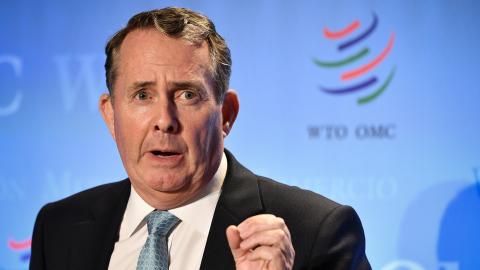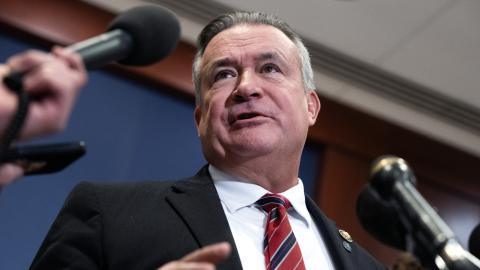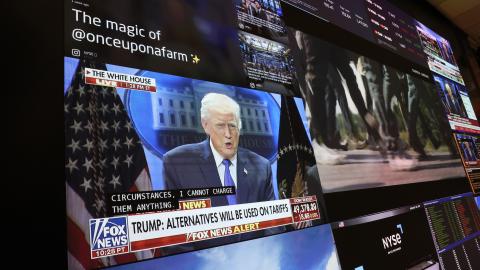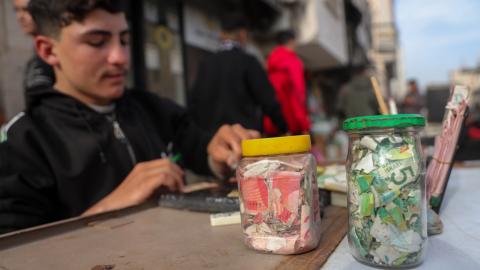
Why Local Stakeholders Support the Nippon Steel–US Steel Deal
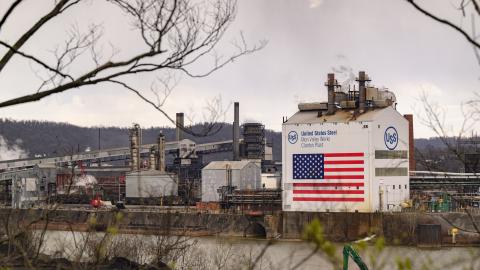
Mayor of West Mifflin, Pennsylvania

President, USW Local 2227
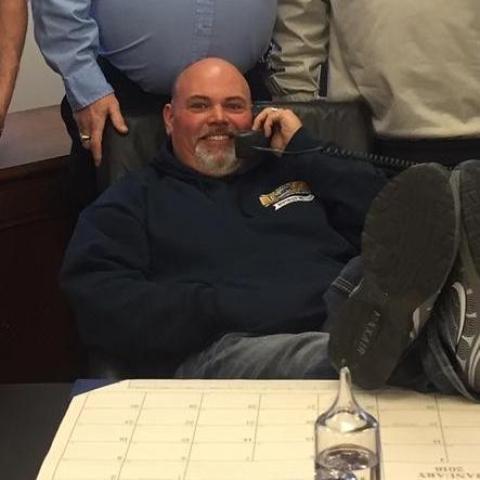
Vice President, USW Local 2227

Senior Fellow and Deputy Director, Japan Chair
William Chou is a senior fellow and deputy director of Hudson Institute's Japan Chair.
In December 2023, Nippon Steel agreed to purchase US Steel for $14.9 billion and to invest an additional $2.7 billion in local plants. Many supported the deal because it would strengthen the American steel industry and protect the United States market from Chinese dumping. But United Steel Workers (USW) leadership joined various national politicians in opposition to the deal. Media coverage of this issue has undervalued the perspectives of union steelworkers and their communities.
Hudson’s Japan Chair will host a panel discussion with stakeholders from the Mon Valley in Pennsylvania. Mayor of West Mifflin, Pennsylvania, Chris Kelly and USW Local 2227’s Jack Maskil and Jason Zugai will share their thoughts on the deal’s local impact.
Event Transcript
This transcription is automatically generated and edited lightly for accuracy. Please excuse any errors.
William Chou:
Great. All right, everybody, thank you so much for joining us here today at Hudson Institute. I’m William Chou. I’m Deputy Director of the Japan Program here at Hudson, and we work on several areas in terms of security, economics, and regional diplomacy.
And obviously I welcome a lot of our first-time visitors to engage with us on our work and our research going forward, but in this increasingly challenging global environment, security, economics, and regional diplomacy are all coming together, and nothing illustrates this more than the Nippon Steel, US Steel deal, that we’ll be talking about today.
Just as sort of like to provide some background about this deal before we jump into a conversation with our panelists who have joined us here from Pittsburgh, the Nippon Steel, US Steel deal is at the center of a lot of different issues. They could include the future of the US industrial manufacturing power, the close US-Japan friendship that stretches from security to economics to cultural relations, and the principles of fair trade and a lawful use of force at a time when the geopolitical picture around the world, especially in Asia, looks extremely uncertain.
And as many of you in the audience and online will know, US Steel put itself for sale in the summer of 2023 after receiving numerous unsolicited bids for it. And in December of ‘23, Nippon Steel made a 14.9 billion bid for all of US Steel, beating out a much smaller bid by Cleveland Cliffs, a company that the United Steelworkers Union backed. Nippon made several pledges such as abiding by the basic labor agreement that US Steel and United Steel Workers Union previously struck, which safeguarded layoffs and plant closures. Nippon also promised to transfer its cutting edge steelmaking technology to US Steel and to make an additional 2.7 billion investment in US Steel facilities such as the Irvin plant in West Mifflin, Pennsylvania, where all these gentlemen are from, as well as other facilities within the US Steel structure.
Oh, sorry, sorry. So for many observers, we supported the deal recognizing that Nippon’s offer was a chance to introduce cutting edge technology to the American steel industry, a chance to strengthen American steel capacity against aggressive dumping by China, and to inject investments into American industrial infrastructure and communities.
That said, there were voices that emerged against the deal, and among them included the president of the United Steel Workers, Dave McCall, who has claimed that Nippon’s pledges were unenforceable and thus in bad faith, but he has also been unwilling to meet with Nippon Steel to sort of hash out a lot of these disagreements.
Other voices included national politicians in Washington, such as President Biden and several senators who expressed concerns about the deal on national security grounds and a need to ensure a strong steelmaking presence in the United States. The fact that Pennsylvania was a vital swing state in the 2024 election also likely played a part.
As part of the sale, Nippon Steel submitted to the deal to the Committee for Foreign Investment in the United States, CFIUS, for review to make sure that there were no national security concerns. Most experts working in the security field believe that there are no concerns, but in early September of this year, word leaked out that President Biden was preparing to kill the deal using CFIUS. Outcry from US Steel as well as outcry from union employees such as Jason and Jack and community leaders such as Chris here, forced the White House to back down, and since then they’ve extended the CFIUS window to later December when a final ruling is expected.
Why we’re here today is because until the events of September when the White House tried to kill the deal, much of the media attention surrounding the deal has been focused on national figures such as President Biden and USW president Dave McCall, but the real stakeholders in this deal are the 10,000 USW members of US Steel, the communities that host and depend on a thriving US steel, and these voices have been overlooked until now. And so this is why we are gathered here today at Hudson to make sure that if leaders pledge to support workers, that the voices of these workers in their communities should be heard.
And so with us today are two union leaders from United Steel Workers Local 2227 in West Mifflin, Pennsylvania, home to US Steel’s Mom Valley Works Urban Plant. Here to my left is Jason Zugai is the vice president of Local 2227, and who also works as a crane mobile equipment trader at the urban plant. Next to him is Jack Maskil, the president of Local 2227, who also works as a mobile equipment trainer at the urban plant. And then as local labor leaders, they regularly engage with Union Steel workers to understand their views on the deal as well as share information with them that may not be easily accessible otherwise. And finally, we have Chris Kelly, currently the mayor of West Mifflin since 2010. Before that, he had served as a police officer for over three decades, serving as a police chief in different Pennsylvania boroughs, as well as other law enforcement leadership positions. And as a mayor of West Mifflin and long-time resident, he has direct insight into the steel industry and its impact on the wider community.
So everyone, I really appreciate you guys joining us here today for this conversation. And I just like to sort of just kick off with a sort of a broad question, which is what is your experience with US Steel? What does steel mean to West Mifflin and the Mon Valley, be it from the worker or from the community perspective? And feel free to jump in anytime.
Chris Kelly:
I’ll talk about the community perspective. US Steel is a fantastic partner in our community, supplies so many things that aren’t warranted or unnecessary for their business, but the engagement with the community is fantastic. Besides the tax base, the schools, the municipality, you could pick up a phone, you can call them, and they’re there for you. We don’t want to lose that part of the puzzle, and Nippon has pledged to continue that support, so it’s very important to the community.
Jason Zugai:
So as the steelworker myself, and Jack, have over 27 years at US Steel. We both have family that worked for US Steel. Third generation, both my grandfathers worked for US Steel, my dad worked for US Steel, my uncle, and many cousins. So it means a lot to me personally because it’s pretty much all I’ve known since I was born, and to all the steelworkers that we represent, I mean, it means a lot to us to keep these jobs going for generations to come so other people’s kids and grandkids could potentially work for US Steel.
William Chou:
Okay. Fair enough.
Jack Maskil:
Pretty much the same. Like Jason said, my father was a steelworker for US Steel, he was a manager for 32 years. My brother was a steelworker. He worked at the Edgar Thompson plant. So like he said, we both have family. We’re both vested in what we do. They provided a very, very good life for our families for a lot of years, and we feel that with the Nippon deal that a lot more families for futures to come will be able to share the same.
William Chou:
Okay, great. Well thank you for sharing your perspectives on this in terms of the broader impact on the community. But I guess just touching on, I certainly heard about this deal back in December last year. I know the story goes back a little further beyond that, but when you heard that Nippon Steel was going to buy you US Steel, what were your initial reactions? What was your initial reaction when you heard that Nippon Steel bought US Steel? How did you respond to that?
Jason Zugai:
Mine, personally, it was a pretty uneasy feeling. I mean, when you first hear about a foreign country buying the company that you work for, it gave us a lot uneasy feel. We didn’t know, didn’t feel real great about it. But then after many meetings, talking to different people, different locals, we talked to Willing Nippon, they’re also a USW facility, spoke to their president and their Executive Board, they’ve been owned by Nippon since 2012. We got a better understanding of how the company works. And then actually we had a meeting with Mr. Mori this past summer, got to ask all those questions as well, and we just gaining a better feel for it ,and we’re behind it.
William Chou:
Oh, interesting. Chris, what was your reaction when you first heard about it?
Chris Kelly:
Well, at first I thought, “My God, I mean US Steel, it’s an icon.” And so I began to look into the two competitors, Cleveland Cliffs and Nippon and calling everybody that I know where they had plants similar to our community. It was overwhelmingly Nippon Steel versus Cleveland Cliffs who doesn’t have the finances apparently, and then I started calling around and doing as much research as I can, and I found out how easy it was to get the top executives from Nippon on the phone or visit and listen to their commitments to the workers and just extremely satisfied. There’s no question in my mind that it’s the best deal moving forward.
William Chou:
And Chris, I think I saw a recent news article with you in your holding a court in your office, in your garage, and meeting with Mr. Mori of Nippon Steel, who’s really driving this deal with Nippon Steel and US Steel. I mean, what was that conversation like? What did you guys talk about? What were the things that you really wanted to raise with him?
Chris Kelly:
Well, the first visit I had to him was a walking tour of the Nippon plant in Wheeling. I can’t walk very well, so I had the opportunity to sit there with your three top executives for two hours. You learn a lot about somebody in two hours. You learn about their families, their commitments, their beliefs. So he was gracious, got the call, and says, “My office is in my garage. I got thrown out of my garage for political reasons, but make the best of it.” And he came and said, “I want to come to your garage.”
And five individuals that were executives came, and they just reiterated their commitment to the community and how grateful they were to finally get some kind of support. Even though we’re a small town, nobody was coming forward to help them with this deal, and you got to remember these steel workers, they just two guys sitting on the table here, but when I go to the grocery store, that’s the guy in front of me, or at the restaurant, that’s the family over there where the kid’s playing football, that’s their sons, and it devastates a community if that was to be taken away.
William Chou:
Fair enough, fair enough. Okay. I’m really glad that you got a chance to talk to them in depth during their various visits, but I guess in terms of, so I think Jason mentioned a little bit about getting a chance to talk to the folks at Wheeling Nippon, but I guess what was the process of just learning more about Nippon Steel? Was that easy? Did you have a wide network of contacts, be it in the communities where Nippon Steel has plants? How did you go about finding that information about what they were like to live with or work for?
Chris Kelly:
Well, we talked to business owners and that particular day at the tour and just regular citizens, but I have followed up, and I’ve called everybody in the social or fraternal organizations that rely on cohesive stuff in the community. And I did it outside of the area of Wheeling where a lot of these people would be working and Alabama and in Houston, and they all had the same thing. “This is the best deal. These people that own and operate Nippon Steel are the real deal. They’re genuine. They’re compassionate.” And I continued to, I did not interact with one person that said anything negative about Nippon, not one. And I’m talking hundreds.
William Chou:
Okay. Was it similar for you guys as well, Jack, Jason, in terms of just part of the information gathering process?
Jason Zugai:
Yeah, same thing. I mean, it started slow. We kind of took a back seat, let the international do their thing, and when we realized there was not a lot of meetings going on and things like that, we started to try to meet with them as well. Obviously we don’t have any negotiating power or anything like that, but just to talk and ask the questions that our members want to know. We walk the floor every day. They want to know what’s going on, what are the investments, what are their plans? We’re not hearing that from anyone else, so we wanted to get all those questions answered and report back to the individuals that we represent.
William Chou:
Okay. So I’m glad you were talking about this aspect in terms of your members asking you questions about trying to find out more about the steel, the various questions that they had. One, if you can sort of shed a little light on what are the questions that they were really prioritizing that they wanted to learn about this deal, right? Obviously you guys are in a union, local union leadership, positions where you have a little better access to information. But what did your members want to learn? And I guess, what was your level of communication with, say, USW national leadership in terms of this information process?
Jack Maskil:
So the information that the members wanted to know was basically the meat and potatoes of the deal, what all is it going to entail? The overall big picture, everything that we all wanted to know, what we were all trying to find out at the time. Still at that time, we were still trying to dig and find out everything that we possibly could. So the longer this has went on, were able to find out more information. Now, as far as the interaction with the international, we really didn’t have a whole lot of interaction with them at the time. But look, they’re good at what they do. We’re thankful for everything that we have. It’s because of them at the end of the day, so we instill that confidence in them to represent us the way that they always have, and I’m sure that they always will. So we didn’t have a lot of information at the time, and I don’t know that they did either.
William Chou:
Okay. Fair enough, fair enough. So I guess a lot of the information gathering processes, part of it’s for your interactions with Nippon Steel, but also talking with folks at other plants and communities as well, right?
Jack Maskil:
Yes, yes.
William Chou:
Okay. Fair enough. Fair enough. Huh, interesting. So I guess, when did Nippon Steel reach out to you guys in terms of communicating, addressing the meat and potatoes of the deal in terms of what it would provide workers, be it in terms of holding to the basic labor agreement? When did they reach out to you and how did they sort of frame it?
Jason Zugai:
So it was sometime in the summer, and we actually asked for the meeting because the international and Nippon were not meeting, so we just asked for the meeting that way we could get down to, like he says, meat and potatoes, find out what’s going on. So we requested a meeting, and they honored a meeting the next morning. They said, “Mr. Mori, we would like to meet with you.” We met with him for about two hours, asked all the questions, explained that we have a hot mill from 1938, it’s not going to last much longer. We need investments to our hot mill, to our facility to keep running.
And obviously not committed to anything, but he said he’d do the research and take a look at everything. And he did. He brought his top engineers over from Japan, toured it. And then what, about five weeks later, there was a press release that he’s committing to at least a billion dollars for a new hot mill in our facilities. So that went a long way with that. And then when that meeting was over, he actually went out, there was a town hall, maybe a couple hundred steelworkers from all three plants going over the same information and answering every one of the members’ questions in the audience.
William Chou:
Okay. Okay. That’s interesting. So in terms of, I guess, so obviously you guys had to engage in a information gathering process to sort of be better informed about how you felt about the deal. What was the initial reaction from either community members or from other union members in terms of how they initially reacted to the deal and how did that evolve over time?
Chris Kelly:
Well, you have to, a billion dollar investment creates 5,000 additional jobs over a period of four to five years, and then it produces a better outcome which means you’re going to employ more people, you’re going to use more American products and more steelworkers. I mean, it’s a no-brainer. These are our allies, and there’s only a handful of people that are oppose it, unfortunately they’re the ones that got the power.
William Chou:
Jack, Jason, what was the general tenor of the response of your fellow members when they first heard about it?
Jack Maskil:
Basically the same as ours.
William Chou:
Okay. Okay.
Jack Maskil:
Look, anytime there’s change, you’re skeptical. There’s a ton of unknowns, and change isn’t always better. So it was a very uneasy feeling at the time, to be honest with you. And without finding out anything right away, we really didn’t know what to think. We really honestly didn’t know, which put us in a difficult position, which is why we started to try to find out anything and everything that we possibly could.
Jason Zugai:
Falling apart, sorry.
Jack Maskil:
So it all started with that meeting with Mr. Mori. Nothing aggravates me more than to not be able to give my members answers. And they ask every day, rightfully so.
William Chou:
They’re not going to stop asking.
Jack Maskil:
They’re not going to stop asking, so we try to do everything that we possibly can to find out as much information as we possibly could. So they felt the same as we did. The only difference was we were in the positions to try to find out them answers for them. So as the longer this has went on, the more answers that we were able to obtain, the more information, so we were able to provide as many answers as we possibly could to this point.
William Chou:
Okay, fair enough, fair enough. So I assume over time, obviously as people got more information, the feeling towards the deal began to evolve, right?
Jack Maskil:
Yes.
William Chou:
I don’t know. What is the rough percentage of, I mean, I know we’re guesstimating here, but roughly what is the percentage of union workers who are supporting of the deal or opposing the deal?
Jack Maskil:
So we can only speak about our plant, and I would venture to bet that we have 95 percent of our membership easily. And quite honestly in my estimation, the 5 percent that, and I don’t even want to say that they’re not on board, they just may not know all the facts just yet, but it is definitely the majority. Now I can tell you the other two plants in the Mourne Valley, Edgar Thompson and Clearton, has caught on considerably, and I don’t know that they’re very far behind us, but I can assure you that it seems that it’s the majority of the membership in the whole valley.
William Chou:
I understand. Okay. So does that mean sort a level of communication between you guys and your respective local union leaders at Edgar Thompson or Clearton? What is the communication between the different local unions, union locals? Is there much intercommunication, or is it primarily working with international?
Jason Zugai:
We do communicate with the other locals. We have the vice president at Clearton is on board. He finally listen to us and talk to us, ask the questions, and he’s kind of taken a bull by the horns at Clearton and got a lot of the members on board. And unfortunately Edgar Thompson, they’re doing what the international ones on their union leadership, but there’s a lot of guys that are vocal that are ex-union leaders that are getting involved and go into the meetings with us, asking the questions, and then reporting back to the floor, to the guys that are working on the floor.
William Chou:
Okay. So actually that touches on a good point. What is the communication between you guys and international on this? How does the communication work? How does it usually work between international headquarters and local unions? What is the exchange of views process like if you can sort of shine a little light on it? I think that’s one of the issues that we’re, I think a lot of us are still unclear about and would love to learn more.
Jason Zugai:
So the international, we don’t usually speak directly to the international president. We speak with our district director. His name’s Bernie Hall, so if we have questions, we would reach right out to Bernie himself, talk to him. And he’s kind of like the middleman. Before we did have a meeting, we requested a meeting with President McCall, I believe it was October 2nd, sat down and just had some questions with him and wanted to know why he was against the deal. And is there any other deals going on that we don’t know about? Help us understand why you’re so opposed to this deal when literally our jobs are on the line here in the valley.
William Chou:
And what was the answer when you raised these sort of questions?
Jack Maskil:
Look, President McCall, to our knowledge from the word go, has requested from Neppon, how can I word it, everything to be put in writing, a detailed proposal. He’s looking for a detailed proposal of where all the investments are going to go, which plants, how much, what’s the plan, the billion dollar hot mill, a projected start date, a projected end date, the 300 million to the blast furnace, 14 blast furnace, so he has asked for a detailed proposal in writing by the ultimate parent company, which our successorship language clearly states, which all along, that’s all any of us have wanted was what we have. We have to keep what we have, which, to our knowledge, Neppon has agreed to, but we don’t know that if they’ve provided him with that exact information that he is seeking to be able to get things rolling. We’re not sure on that, but he’s been clear from the beginning that that’s what he’s looking for, which so are we. That’s all any of us want, so that’s where that’s at. I’m not sure.
William Chou:
Okay. Chris, and also, I guess one thing I wanted to learn about is what are some of the broader ramifications in terms of what this deal would mean if it were to go through in terms of, or if it doesn’t go through, what would it mean for the broader community, be it say, suppliers or end users? If you guys can shed a little light on that because I think one of the things is that you guys talked about the hot strip mills and what kind of products are you guys making, where is it going to? How am I experiencing the work that you guys do in my everyday life?
Chris Kelly:
Well, as far as the community goes, if this deal does not go through US Steel already indicated that they cannot afford to modernize, and they would close. And as far as Cleveland Cliffs has indicated, they would close the plants and move their headquarters to Cleveland. Now, I don’t know about you, but I don’t think, what are we going to call the Pittsburgh Steelers when there’s no steel? We don’t give a damn, the name. I mean, it’s ridiculous for every job that they work in there. There’s seven jobs in the municipality that are affected, the suppliers, the hotels, the restaurants, everything. So you take a thousand people with there, you can say it’s employing 7,000 people in our community. And that’s not even counting the grocery stores, the gas, I mean, it’s a ripple effect. It would be devastating for a small community.
William Chou:
Okay. How about you guys? Just in terms of the products, just a way of a better sense of what kind of products that you guys are making that we end up using?
Jason Zugai:
If you have a refrigerator, washer, dryer, all those kinds of things. That’s what predominantly comes out of the urban plant is that we roll steel, and they go to the GE, Whirlpool, all those Willing, we send a lot of product to Willing Neppon, down in Willing.
Chris Kelly:
So there’s your national threat, right? We’re making appliance steel. I mean, good God, what the hell’s wrong with these people in this town? Come on. Come on.
William Chou:
So here’s the thing though, right?
Chris Kelly:
Sorry.
William Chou:
I mean the whole issue about national security has been a huge point of contention, especially by a lot of the political observers in this case. I guess my question is, we talked a little bit about in terms of your engagement with USW International, with Nippon Steel, but obviously the politicians, be it local politicians or national level politicians, have been talking a lot about this case. What has been your sort of experience in engaging with them, be it on the local, state or national level? What has that been like?
Chris Kelly:
Well, I’ve sent letters to just about everybody that represents me in the state of Pennsylvania, and the only thing I’ve gotten back is a generic canned form letter about national security. The presidential candidates won’t even take your call. I mean, they’re not talking to the people whose jobs are going to be affected. They’re all talking this broader, “Oh, we can’t sell it for US Steel, an iconic company.” But if you get a return call, come and meet them. The one congressman, I mean Federman, he lives in the shadow of the steel mill, lives right across the street, and these are the guys that are going to lose their job if it doesn’t go through. I can’t get a return call from him. And we border him. He was the mayor of Braddock, I’m mayor of West Mifflin. There’s only a river in between us, can’t get a return call, and this was going on for months.
Jason Zugai:
Obviously we all know it was an election year, and nobody was really speaking and taking a stance on pretty much anything. So since November 5th is over, we’ve been getting lots of calls and meeting with a lot of politicians. We have a full day today after we leave here with a few other politicians to hopefully get our message out to explain to them how important it is for us to these investments and to keep our jobs in the long term.
William Chou:
Okay, great. And what has been the response to that outreach effort, either after September when the deal looked like it was in jeopardy or after the election on November 5th? What has been the response from the political side?
Jason Zugai:
Everyone that I’ve talked to in the last few weeks, it’s been positive. They say they understand the deal now, that they’ve talked to people from Nippon, people from US Steel, they’ve talked to Jack and myself and other union members, just regular members that we brought to the meetings, and they said they were going to take a stance and support us.
William Chou:
Okay. Is there a sense of how they might impact the decision makers, be it in the White House or elsewhere? Is there a sense of how that process is going in terms of when you talk to these politicians, are they moving on to other policymakers?
Jason Zugai:
I would think the local politicians, senators, talking to the governor, and the governor is trying to help any way he can. I mean, he’s set up to lose 3000 or more jobs in his state if this deal doesn’t go through. So I know that he’s, from what I hear, he’s behind the deal, and he’s helping behind the scenes trying to get this done, so it just works its way up the ladder.
William Chou:
Okay. Chris, what’s been sort your experience about this as well?
Chris Kelly:
It’s like the presidential election and the undecided voter. It’s bloating. They know how they’re going to vote. They know if they support it, or they don’t support it. At this time, there’s nothing going to change their mind. It’s whether they’re pro or con. Quit hiding behind your desk and being ghosted. Get out there and tell the, how could you be against it? Give us a reason you’re against it. Now I’ve talked to the lieutenant governor who’s, he’s a neighbor of mine down the street, and he’s behind the scenes trying to push it up, but we need to get out there and say, “This is what we’re doing. Put your foot down. This is ridiculous.”
William Chou:
So in terms of, one of the things that they frequently site, is the national security concern, right?
Chris Kelly:
Shit.
William Chou:
Okay. People are laughing.
Chris Kelly:
Sorry.
William Chou:
I guess what is your take on, obviously, I know a lot of your members care about the meat and potato issues in terms of jobs, but what do you guys think about in terms of, is the national security angle a big concern for you guys or not really?
Chris Kelly:
Our seventh fleet is in Japan, and they make electronics for the fighter jets that our soldiers fitted. We have 20,000 soldiers in the seventh fleet there, and if it was a national security, I was born and raised in Homestead. It was one of the largest steel plants in the country. And if there was any way that that plant was being taken over for military use, the military and the FBI are present watching every single role. And besides, what are we going to do if there’s a war? We’re going to begin in a cardinal ship in and say to the US workers, the American workers, “You’re out of a job because it’s national security.” It’s such a ridiculous, I’m sorry I swore, by the way, well, not really, but anyway, it’s ridiculous. I don’t know if I can make that point any clearer.
William Chou:
Yeah, I think-
Jack, Jason, what do you guys think about, is the national security concern either an issue for your members or something that you guys sort of think about a lot, or is it more focused on the labor side of the issue?
Jack Maskil:
Look, as far as the national security concern, that’s what CFIUS does. That’s their job. If they clear and determined that Nippon is not a national security threat, I don’t see the problem. That’s what they get paid to do. So as far as my opinion, I don’t think, I don’t see them as any kind of a threat, but my opinion means nothing. It’s what CFIUS, what they feel. Okay. Again, that’s what they get paid to do. Whatever they rule, we have to abide by it and go from there, but I just don’t see a threat.
William Chou:
Okay.
Chris Kelly:
Can I just add one thing? Where was the national threat when Nippon bought other steel mills in the United States? The finished from their plant goes to Nippon Steel. So what do we do? Bypass national security there? Their headquarters is in Houston, North America Steel. The last time I checked, Houston was in the United States. How ridiculous. I mean, Mitsubishi just bought a plant in the county right next to us, Westmorland County, where they produce the chips that are going into the fighter jets. How is that not a national threat? Another steel worker. Hong Kong just bought a steel plant in Belgium, whatever.
William Chou:
I’m sorry, Jason.
Jason Zugai:
I mean, in my opinion, it’s not. And if this company wasn’t called United States Steel, I don’t think we would’ve been talking about this.
Chris Kelly:
You’re right, you’re right.
William Chou:
So I do want to sort of raise the question of technology because that’s one of the big commitments that Nippon Steel has said, right? In addition to the abiding by the basic labor agreement and all stipulations in terms of no layoffs and continued investments in US Steel, they’ve also made promises to make investments in technology. So they have this hydrogen blast furnace technology that will make steelmaking much more efficient as well as also reduce, more efficient and more profitable. Has the technological angle been one that you guys have been discussing in terms of, because you talk about the need for generational investments and generations of steelworkers and providing for the next generation of steelworkers, your children, your families, your friends. How much of is the technological angle that Nippon is offering, how much do you know about that? Is that convincing? What do you think about that?
Jason Zugai:
I think it’s huge for us. We operate all three facilities in Allegheny County, and it’s by far the strictest county, I think, in the country. So if they could bring technology, Mr. Mori said that they were 10 to 15 years ahead of us on technology to reduce our pollution, which is already we’re 90, I think it’s 98.9 percent in compliance as it is. If we can bring that down, would help us in the future and especially working on of Allegheny County.
Chris Kelly:
The Claren Works, who produces the Coke, is fined millions of dollars, it seems like almost monthly. When US Steel was talking about putting additional money into the valley and just the health department has refused to work with them. And Nippon, in my meetings with them, we talked about technology where US Steel contributes, not contributes, but they earmark about $50 million a year technology. Nippon guarantees $560 million in technology and green production by 2035, I think it is, and that’ll be a huge improvement for our valley. So again, another positive.
William Chou:
Okay. So I guess just in terms of just few last questions before we throw it to the audience. In terms of, you mentioned this whole process has been sort of information gathering process. You heard about the deal, initially you were skeptical about it, but it became a learning process both in terms of talking to Nippon Steel, talking to other fellow workers at other plants. What aspects of this deal do you still want to learn more about? What are the things that are still questions for you guys?
Chris Kelly:
My question is why is anybody opposed to it? Simple. Tell us why you oppose it. Give us a strong reason, and let us work on that. I have nothing to do with the deal. I’m not the steel workers, these guys are, but tell us what’s bad for our community if this goes through. Tell us one thing, and they can’t do it.
William Chou:
Okay. When you press them, when you talk to folks who are connected to this deal, when you press them on that, what is their response? Do they sort of just sidestep it?
Chris Kelly:
Oh, yeah. It’s like, “We’re going to get back to you. We’re going to discuss it.” They’re not going to discuss. They’ve already, they’re either pro or for, but some of them are just waiting to be told how they’re supposed to vote.
William Chou:
Yeah.
Jack Maskil:
So one of the things that I would like to know more about the deal is we all know what we committed investment is in the Mon Valley, the billion dollar hot mill, the 300 million that they’re committing to the blast furnace. I personally would like to know what the plan is moving forward for the rest of the company, all the other plants. I would like to know what the plan is at each plant, what they plan on doing to keep all our other members at all the other plants working for years to come. That’s one of the main things that I would like to learn more about.
William Chou:
Okay. Jason?
Jason Zugai:
No, the same thing. I mean, we obviously looking out for the valley first, that’s where we work, that’s where we live. But of course what Jack said, we are looking out for the whole steel company and all the members that are represented.
William Chou:
Okay. Okay. So in closing, I sort of just want to close with this one last question. So President Biden has come out against the deal on many occasions. Last night, President Elect Trump also voiced his opposition to the deal. I guess obviously we had you guys join us here at Hudson today primarily to just sort of speak to a wider audience, especially down here in DC. In terms of are there one or two things that you really want to make sure that this wider audience should know about the seal in terms of your perspectives, especially as the people who are either working in the plants or living in the communities where these plants are such a major part of?
Jason Zugai:
So for me, yeah, very frustrated with the news that came out last night I thought. I didn’t expect that to come out, so that was like a gut punch. I’d like them to know that I would like to sit down and talk to them and find out what other plan they have if they don’t like this deal. What’s better? What other ideas that you have that’s going to be better than that because we don’t have one. I can’t think of another better idea in the investments, and I just want them to realize that they say these things in the media, and the stance that they take is going to affect thousands of steelworkers’ jobs. And that’s very frustrating to me to potentially lose these jobs for these families, and maybe I just wish they’d talked to the people that actually are affected by this.
William Chou:
Fair enough. Jack?
Jack Maskil:
Look, at the end of the day, if this deal does not go through, like Jason just said, if there’s something else in place, tell us. We would love to know. But what we have in front of us right now seems like a fantastic opportunity, not only for my family, but decades to come. More people. Look, I have to go get new hires in two days that just got hired. I want them folks to be able to retire from this company, and we feel that the investment from Neppon will give them the capability, look, them, their children, their grandchildren. That’s what this deal will give the capability of a lot of families to have. And also people say that if the deal doesn’t go through, US Steel, they can survive on their own. They have the money. We’re told that US Steel will not remain US Steel whether or not this deal goes through.
So people call it a threat. Maybe it is, maybe it isn’t. But we have to plan to move forward like it’s a true threat, that they will not remain the company that they are today. That’s how we have to proceed to secure the jobs for many, many families to come. And like Mayor Kelly said, one of our jobs affects seven other people’s jobs. Them communities will be an absolute ghost town if this shuts down. There will be not only our 3000 jobs, there’s going to be a lot more jobs that are going to be lost if this deal does not go through.
Our job is to sit here and try to fight for the members on the floor to make sure that they have benefits, income to be able to provide for their families. And like I said, the international does a fantastic job and always has and always will have our best interests at heart, so we hope at the end of the day that they will do right by us, all of our families and future families to come, to secure employment in the Mon Valley and across the rest of the United States at all the rest of our plants.
Chris Kelly:
Well said.
William Chou:
Okay. Good. Mayor Kelly? You get the last word. What do you want to make sure everyone knows?
Chris Kelly:
I was going to say maybe they have a concept of a plan. Come in, talk to the municipality leaders, talk to the families it’s going to affect, talk to the school district who’s going to have to cut jobs, cutting teachers, the services, it’s all going to be passed on to the residents, senior citizens. Taxes are going up. Just come in and talk. Talk to the workers, talk to the municipality, tell us why you’re against it and be honest about it. That’s all. Honesty pays off.
William Chou:
Well, hopefully you guys will be just as honest during the Q&A session that we’d like to sort of kick off with. Before you ask your question, please wait for the microphone and also identify yourself.
Peter:
Hi, Peter Summel with Capital Intelligence BBN. My question is, I mean, can you understand why President Trump-elect, who’s supposed to be the most pro-business president ever, and this is good for Pittsburgh, this is fantastic for Gary, Indiana. Pittsburgh is the headquarters Westinghouse, and they’re going to get billions and billions of dollars of rebuilding the Polish nuclear power industry sector. They’re also going to Ukraine. Why would President Trump be against the Nippon Steel deal? And who do you suspect, is it Cleveland Cliffs that’s owned by Brazilian? Is that behind it in Ohio? I mean, you must know more. This is surprising. It surprises everyone who’s followed Trump in administration.
Jason Zugai:
I can take it. Yeah. So last night, like I said, was very frustrating. I’ve been to some Trump rallies, I’ve spoken at a Trump rally, I’ve got to meet the president as well, and I hear what he says. He says, “I want investment from foreign countries into the United States, and I also want to save American jobs.” Well, you have both in one deal. You have investment from a foreign country, and you have save American jobs. So you got two birds with one stone. I just don’t see the problem. I don’t understand why. That’s why I would like to speak with him again and find out why? Why do you want to kill this deal?
Peter:
Is Senator McCormick supporting this deal?
Jason Zugai:
McCormick? I am talking about President Trump.
Peter:
Yeah, but is McCormick supporting it?
Jason Zugai:
As far as I know, I haven’t heard him come out in public.
William Chou:
Anyone else or should we? Yes, gentleman in the front.
Chris Kelly:
I’m telling you everything I know. You’re looking at me like I’m hiding something.
Peter:
No, Cleveland, Pittsburgh. Oh, I agree.
Chris Kelly:
It’s tough.
Peter:
Because they just want to take it over for a cheaper price?
Chris Kelly:
Who the hell in Pittsburgh likes anything from Cleveland? Seriously.
William Chou:
We got the sound bite.
Chris Kelly:
Whoops.
Jack Maskil:
In regards to Cleveland Cliffs, when we sat down with President McCall, I flat out looked him in the eye and asked him, “if there’s something else in place, please tell us. Please.” And he gave zero indication, zero indication that there was anything going with Cliffs. So if there is, we don’t know about it.
William Chou:
Okay, great. Gentleman in front.
Doug Palmer:
Hi. Doug Palmer with Politico. It’s a similar sort of question, and you’ve already explained your understanding of why David McCall is not on board with this deal, but I just wondered if there’s any additional insights you could provide on that. Is there a history of bad relations between the USW and the US Steel company in general? And is that sort of playing out in this situation? He seems to be very adamantly opposed to the deal to the point where he’s not even willing to meet with the buyer to sit down and sort of hash out an agreement. And just from the outside it’s sort of difficult to understand why that’s the situation.
Jason Zugai:
Okay. So yeah, unfortunately there’s not a great relationship between President McCall and the CEO of US Steel. So I think that does play, in my opinion, plays a part in this as well.
Doug Palmer:
Do you know what was the cause of that stormy relationship?
Jason Zugai:
Just years and years of negotiations and things like that, contract disputes, things like that. Anything else, I would just be speculating.
William Chou:
Gentleman in the front, the gentleman in the back.
Tsubasa Yamazaki:
Thank you for taking my question. I’m Tsubasa Yamazaki from Kyoto News. What do you think is necessary to gain approval from Mr. Trump and Deputy McConnell for this acquisition plan?
William Chou:
Just to clarify, your question is about what do these gentlemen think will be necessary to gain approval from President-elect Trump, and I didn’t quite catch the second name
Tsubasa Yamazaki:
Tsubasa Yamazaki.
William Chou:
Oh no, no.
Tsubasa Yamazaki:
I want to know, I’d like to ask you, both sides, from community and labor union, what is necessary to gain approval from Mr. Trump and David McConnell?
Chris Kelly:
When you go to buy a house, and there’s some problems with the house, you ask it to be taken care of, right, before you buy it. We’re saying Nippon wants to buy a house. Trump and Biden and everybody else say, “Well, tell us what the problem is and give us a chance to fix it.” Same thing, trickle down. That’s what I think needs to happen. They need to come in and say if it’s a national security threat, there’s people to deal with that, but if it’s personal or municipal-based or worker-based, those are issues that could be worked on and rectified.
Jason Zugai:
Again, we have to wait for the CFIUS review to come out, but if it comes out, and they don’t have national security threats or issues, I don’t understand why anybody political would try to get involved. I mean that was the main thing. We’re worried about national security and economy stuff too and economy, but I just don’t understand why they would get involved if CFIUS rules that it’s okay.
William Chou:
Sorry, do you have a two-finger? Follow-up.
Doug Palmer:
Follow up.
William Chou:
Okay. Okay.
Doug Palmer:
I mean there was sort of a leaked letter where the CFIUS committee outlined some of their concerns, and one I think was that potentially technology could be transferred to another country or that if Nippon bought the facilities here, they could potentially close down some facilities that are vital for defense production and move those to India. And then there was also the concern about Nippon in other jurisdictions doesn’t have a robust record of bringing anti-dumping and countervailing duty cases, whereas US Steel has been involved in a lot of those. And so that was another potential concern that was mentioned in the report. Just do you have a response to either one of those?
Jason Zugai:
No, I know that they filed an extension, I believe from what I’ve been hearing, that there’s nothing in the CFIUS report that can’t be mitigated at this point.
William Chou:
And also for clarification from my understanding was that shortly before the leaked letter from CFIUS arrived at Nippon Steel, Nippon Steel also made a statement that they would comply and basically cooperate with other steel plants in the United States in sort of tariff and other protectionist measures I believe. I believe that is the case.
Doug Palmer:
That matches my understanding. I just wonder what is your understanding of the timeline at this point? Because again, in that letter it sort of indicated that the deadline had been September 23rd for CFIUS to give its recommendations to Biden and then that would’ve triggered a fifteen-day period for him to make a decision. My understanding is it’s been delayed 90 days, and so the new deadline is sometime in December. Are you expecting this to come to a head before the end of the year?
Jack Maskil:
Yes.
Doug Palmer:
And have you had any opportunity to meet with people in the administration to sort of urge them to basically come down in favor of the deal?
Jason Zugai:
So to your first question, yeah, we’re hearing that it’s going to come down by the end of the year, probably December 22ish time. Probably see some movement a week before then with some paperwork and things like that. I haven’t had any talks with the administration. I mean there’s, you know, we have a bunch of people that we’re going to speak with today while we’re here to try to, like I said, get our message out, explain what it means to the members on these jobs.
William Chou:
Gentleman in the back with the question. And then anything from this side?
Henry Hecker:
Henry Hecker? Retired FAA. I thought, just as a question regarding a deal between the two companies, is it possible US Steel could retain control of say, 60 percent of the stock, and Nippon Steel 40 percent and still permit a great deal of modernization and it still be considered US Steel, be a joint company? Have they looked into that? Is that a possibility?
Jason Zugai:
I haven’t heard that at all. That’s a good question though. That’s something we could ask. Thank you.
William Chou:
So if I may just quickly jump in, my understanding is that Nippon Steel is not willing to transfer its technology unless it owns everything outright, which is why their high-end technology is not in part of their joint ventures with other steel firms. So that is my understanding. That obviously is subject to their own change. I think we have questions here, and then we’ll go to the gentleman over in the back.
Speaker 9:
Hi. I’m from Marvin and Corporation. You mentioned your reaction to President-elect Trump’s comments yesterday, that it was a gut punch, and you also mentioned that you’ve met him before. Did he give you any indication that he was going to work with you or change his position otherwise? Is that why you characterize it as a gut punch?
Jason Zugai:
He didn’t commit anything to me. He just said, “After I get elected we could revisit this and talk.” I just explained that we need to get this deal done. He expressed about being a foreign country, and I said, “Okay, I’m looking forward to meeting with you again.” And then we didn’t hear anything. He didn’t mention it at the rally that night, which was the Monday before the election, which we brought thousands of steelworkers there in show of support and then flew to Michigan, had another rally, and did not mention it as well. So in our mind, maybe we’re backing off of that a little bit and then we haven’t heard anything and then last night out of nowhere we got that message. So like I said, that was a gut punch because not, did I think he was in favor? No. But I thought maybe he wanted to talk more, talk to the members and explore it prior to being inaugurated, but it came out of nowhere.
William Chou:
Gentleman in the back.
Evan Tindal:
I need the mic.
I guess my question is-
William Chou:
Sorry, if you could introduce yourself.
Evan Tindal:
My name is Evan Tindal investor in US Steel of a company called Byron Capital. It seems to me a key player who could be a key player in all this is Governor Shapiro, and he was rumored to have called Biden in support of the deal in September. And I’m just wondering if you guys have any thoughts on what’s it going to take for him to, because you said that you think he does understand the importance of the deal, but what’s it going to take for him to actually kind of step out on a limb and be a little bit more proactive publicly in his support? Do you think that’s possible or what would it take?
Chris Kelly:
Courage. I was going to use another word, but come on. I mean, I said it earlier. If you’re going to support behind the scenes, come out, just do the right thing. That’s all. I think that the pressure from other locals or other national representatives that represent the interest of Pennsylvania need to step it up with them. And the Lieutenant Governor lives in West Mifflin, my town, where the urban works is at. He doesn’t want to see these people lose their job. Just got to come forward. We’ve gained momentum. Just let’s keep the engine moving.
Curtis Watkins:
Hi, I am Curtis Watkins. I grew up in Monongahela, Pennsylvania. The question is, can you describe the current state of the hot strip mill that you have right now and sort of the investment that is there right now or needed to make that competitive? And could you talk about what a new hot strip mill would do to make you more competitive? And then the last question is, have you seen written commitments from Nippon during the pendency of this deal in your meetings with the company? Thank you.
Chris Kelly:
Talk about Palm Mill.
Jack Maskil:
Yeah. Then you could take it. So our hot mill is a 1938. 1938. So you can only imagine its state. Where it’s at right now is US Steel has made it clear that they will not be putting any more capital money into the hot mill. Every year we take a yearly outage, each line goes down for a major repair for a week, 10 days, two weeks. For the past 3, 4, 5 years, the hot mill’s outage has gotten less and less and less and less. They’re doing very little, to say they’re putting Band-Aids on to keep it going is, that would probably sum it up. They will not be investing any more money into it. That’s where that’s at. It’s old, and they won’t be investing.
Now this new hot mill upgrade replacement will give us the capability to expand what we can run, what we can make with the technology. This investment to build a brand new hot mill is the best way I can sum it up is a game changer, true game changer. And that will give us the capability to keep moving forward. It’ll increase capacity, just everything, all the way around. Again, it’s a game changer. And in my mind, without it, without this, you can flip the hourglass because I truly feel that once that sand hits the bottom, the valley will be done. That’s my opinion.
Chris Kelly:
The other part of your question is about the deal. How did we confirm it? I asked Mr. Mori himself, and he provided me a letter that he sent to Mr. McCall outlining the commitment for all the items in the current contract and willingness to work.
Jason Zugai:
And I also have seen every investment that they pledged and all the other things in writing signed by Mr. Mori. The big holdup was if something would go wrong, who would back up our contracts, our pensions? And ultimately the USW wants NSC to be the parent company. So as Mr. Mori started to understand that and talk, so the way that it’s set up now would be that if something would happen, they would go belly up, first line would be US Steel. So anything that US Steel would own would go towards protecting us. The second line would be Nippon North America. If for some reason it depleted every asset that they owned, then it would go to NSC, so we actually have three layers of protection for our contracts and our pensions.
William Chou:
We can take one last question if there’s one. Okay, one last question.
John Walborn:
Hi, John Walborn, individual investor. Trump’s tweet last night implied that if he’s able to stop Chinese dumping that it’ll improve the profitability of US Steel, and maybe that’ll make it a good enough business to do all the things that you guys would like Nippon to do. And he also implied that maybe the government would provide some loans or some other type of assistance in order to do that. If he did those things, do you believe that it could achieve the same result as under Nippon ownership?
Jason Zugai:
I do not. I believe that the Mon Valley’s days are numbered. They’ve already taken the investments that they were going to make in the Mon Valley and purchased Big River in Arkansas, built Big River too. So I believe that that is US Steel’s plan in the future is to move that to there. Nippon came in and said, “No, we want to invest here, and we want to keep these mills running.” So if Nippon doesn’t get it, and even though we have some tariffs, which is what we know he’s going to put on, maybe some investments from the government, I still don’t think, I think US Steel’s long-term plan is to move the valley and the orders and everything down to Big River in Arkansas. They don’t want to deal with Allegheny County. We need the technology from Nippon to be able to function and be able to operate under the levels in Allegheny County.
Jack Maskil:
So like you said, yeah, my opinion as well. Could US Steel, with the tariffs and some government money, maybe. They might be able to do that, but that’s not their plan. What they’re capable of doing or what they might be able to do is one thing. But what their plan is, we feel that it’s completely different. And like he said, it wouldn’t matter. That’s not in their plans.
William Chou:
Great. Well thank you again for providing your perspectives on this deal. I think everyone in the audience learned a lot and really benefited from your actual direct experience with a lot of these issues. So thank you again for coming down from Pittsburgh, especially Mayor Kelly. Thank you for coming down from Pittsburgh and please join me in thanking all of our panelists for their discussion.
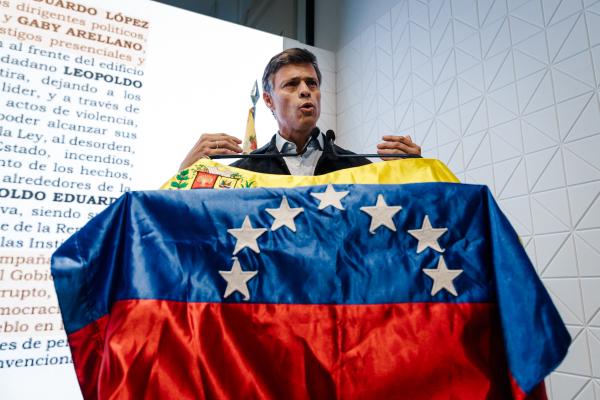
Please join Venezuelan opposition leader Leopoldo López for a discussion on the future of Venezuelan democracy, the role of civil society in credible political and economic reforms, and the pathway to free and fair elections.
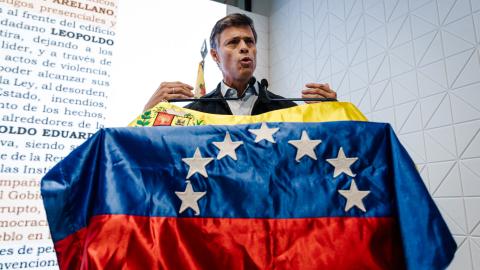



Join Distinguished Fellow Mike Gallagher and Congressman Rob Wittman (R-VA) for a discussion on the congressman’s recently introduced Securing Essential and Critical US Resources and Elements (SECURE Minerals) Act and Congress’s role in securing America’s economic security.

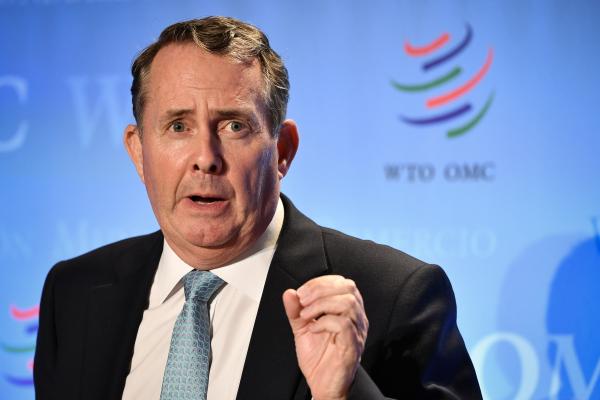
Hudson Institute’s Center for Peace and Security in the Middle East will host Sir Liam Fox for a conversation on the evolving geopolitical landscape in the Middle East.
